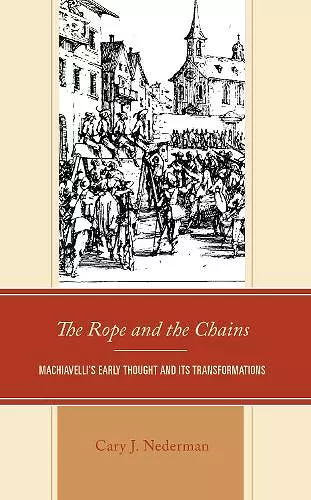The Rope and the Chains
Machiavelli’s Early Thought and Its Transformations
Format:Hardback
Publisher:Bloomsbury Publishing PLC
Published:6th Apr '23
Currently unavailable, and unfortunately no date known when it will be back

Niccolò Machiavelli counts among the most famous (and infamous) political authors in the history of Western political thought, primarily on account of his book the Prince. Before he wrote that notorious treatise, however, he served for fourteen years as a prominent and active civil administrator in the government of the Republic of Florence. Removed from office in 1512, following a take-over by the Medici dynasty that had ruled the city during much of the fifteenth century, Machiavelli was incarcerated and tortured as a result of unsubstantiated accusations of his involvement in a coup plot. Soon after his release from prison, he composed the Prince, which is generally seen to constitute the beginning of his career as a political theorist as well as a comic playwright, poet and military analyst of note. Yet little attention has been devoted to the large body of writings—in the form of prose and poetry, as well as the hundreds of pages of diplomatic and personal correspondence—that he produced in the course of his public service. In an unprecedented interpretation, The Rope and the Chains carefully examines the neglected pre-Prince texts in order to frame his later theories. The book reveals that Machiavelli’s thought prior to the Prince was largely conventional when judged by the standards of his day. At the same time, it also demonstrates his dissatisfaction with the intellectual worldview in which he was enmeshed. Machiavelli “became” Machiavelli once liberated from the rope and the chains by which centuries of tradition had constrained him.
“Cary Nederman's book on the early Machiavelli is a long overdue and masterfully executed study of the Florentine's writings composed before he penned The Prince and his other illustrious works. Nederman examines the young Machiavelli's literary and prose writings to explore the role of, among other concepts, virtue, liberty, and religion in the Florentine's intellectual development. The Rope and the Chains: Machiavelli’s Early Thought and Its Transformations is a major contribution to Machiavelli studies and to scholarship on early modern intellectual history.”
-- John Mccormick, University of Chicago"Few scholars possess the intellectual firepower to engage the varied perspectives of historians, philosophers, and social scientists on Machiavelli’s political thought. Cary Nederman’s latest book leaves no doubt that he is in that select group. His expertise in ancient and medieval European ideas yields cogent and insightful analyses of Machiavelli’s early writings, revealing a pattern of both continuities and disjunctures with his later, more celebrated works which are indispensable for a well-rounded understanding of his political thought as a whole. Rather than producing another intellectual biography, Nederman has judiciously employed linguistic and conceptual analysis to trace an impressive range of themes in these neglected early writings. Political theorists will be gripped, in particular, by Nederman’s analysis of how the concept of virtue came to be problematized in relation to fortune, as well as of the “staggering” change that occurred in how Machiavelli understood the relation between liberty and security by the time he wrote The Prince. Readers will also appreciate Nederman’s careful examination of Machiavelli’s early commentaries on leaders and institutions in not only Italian but also French and German politics in the first decade of the sixteenth century."
-- Jason Maloy, University of Louisiana, Lafayette"This is the best study currently available on Machiavelli, one which investigates the vexed question of the relationship between Machiavelli the political actor as Secretary of the Florentine republic and Machiavelli the political thinker after the republic’s fall. An audacious and novel reconstruction of Machiavelli’s political thought, it is at once a close textual analysis of Machiavelli’s language, and a deft and brilliant exploration of the genealogy of his central political ideas. It is undeniably an indispensable addition to Machiavelli scholarship.”
-- Benedetto Fontana, Baruch College/ISBN: 9781793617248
Dimensions: 237mm x 157mm x 20mm
Weight: 422g
168 pages